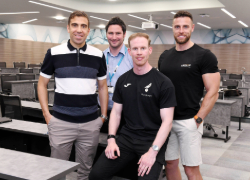New centre to develop criminology research at Teesside University
Crime figures have significantly declined in the last decade but a new research centre to be launched at Teesside University is warning against complacency saying crime isn’t going away – rather, it’s mutating
Teesside University’s new Centre for Realist Criminology is set to investigate the changing nature of crime and the social harms and injustices that currently beset society.
The Centre is being launched with a conference on 13 September at Teesside University’s Darlington campus and will feature the world’s leading realist criminologist – Professor Elliott Currie from the University of California.
Teesside University has a long established international reputation for research excellence in criminology and some of the leading names in the world are now based at the institution.
Professors Simon Winlow and Steve Hall are the Centre’s co-directors and they are determined to shake up contemporary research.
Professor Winlow said: 'Crime rates have dropped significantly since 2000 but most criminologists are unable to explain precisely what’s going on. On the surface of things, all the usual forces that might signal a rise in crime are clearly in place: significant reductions in living standards, mass youth unemployment and underemployment, a growing gap between rich and poor. Rather than simply assuming that crime statistics are faultless representations of reality, it makes sense to start thinking about the how crimes – and statistical measures of crime - are changing and the underlying forces that are driving these changes.’
Professor Hall added: 'While it’s clear that crime control measures are important when considering the crime decline, these measures simply keep a lid on things. In no way do they address the fundamental motivations that drive people to commit harmful acts. It’s also clear that criminal markets are changing, and they’re changing in ways that are leaving traditional policing methods trailing in the dust. Lots of criminal markets have migrated from street corners to the internet, and the police simply haven’t got the resources to keep up.
'We should also acknowledge that many hidden crimes continue to effect individuals and communities. These crimes are very difficult for criminal justice agencies to keep track of as they tend not to be reported, but the problems they cause can be huge.'
Anti-social behaviour is on the increase – eight out of ten people said it has risen when recently questioned for a recent report by the Office for National Statistics (ONS) with nearly a third saying they had personally been a victim of yobbish behaviour or had witnessed an incident in the last year.
Professor Winlow argued: 'It is ridiculous for criminologists to argue that, because we are seeing statistical falls in crime, the world is becoming a nicer place and that our society is becoming more civilised and humane. The world continues to experience a broad assortment of social harms that exist beyond the reach of the modern criminal justice system.'
He added: 'The riots in 2011 suggest what lies ahead for British society. What we see is a broad range of social antagonisms developing in areas that are the least equipped to deal with the current financial crisis and the ongoing austerity cuts. People are angry, and they feel that their views are not represented within a banal political system. We are now more competitive, egotistical and anxious than at any point in our recent history. Unless fundamental antagonisms are addressed, we should expect more outbursts of this sort as the twenty-first century unfolds.'
Professor Hall, whose research areas include crime and post-industrial societies and politics and social order, concluded: 'For too long criminology has focused on our legal system and often relatively minor infractions of the law. We want to revitalise criminological research by extending its reach into the field of social harm. We want to ask searching questions about the way we live these days, and the absolute failure of the current political order to address the decline in solidarity and community sentiment.'
Members of the new centre include:
• Professor Georgios Antonopoulos, who is an expert investigator on the financing or organised crime and is developing expertise in how to prevent the online trade of fake medicines, with grants worth almost £1m from the European Commission. • Dr Georgios Papanicolau, who specialises in policing, criminal markets and human sex trafficking. • Dr Philip Whitehead: crime and neoliberalism, probation, criminal justice and crime and morality. • Dr Anqi Shen: policing, comparative criminal justice and criminal law. • Dr Louise Wattis: gender and crime and fear of crime.
 Teesside University awards Honorary Doctorates to industry
...
Teesside University awards Honorary Doctorates to industry
... Alumni support elite football event
Alumni support elite football event Girls explore digital careers at state-of-the-art new
...
Girls explore digital careers at state-of-the-art new
...